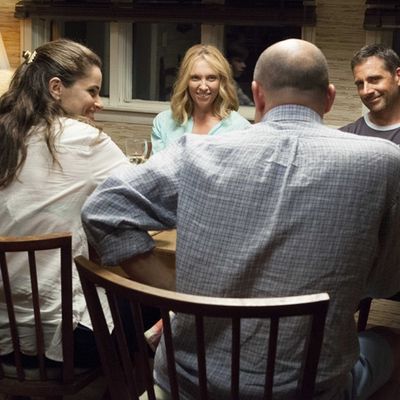
The Way, Way Back is an “It Gets Better” teen movie — directed not at gay kids, but at any kid (or anyone) who is or was lonely, disconnected, parentally neglected, and has/had no outlet for self-expression. Set in mid-summer in Wareham, just off Cape Cod, it centers on a boy, Duncan (Liam James), who takes off during the day from the house of his mother’s nasty boyfriend to work — unbeknownst to anyone in his family — at the local water park. There he finds a surrogate family and with it, some precious self-esteem.
The movie’s first shot is so direct and pure and has such punch that it’s almost too good: It leaves you with little about the characters left to discover. The shot is of the mother’s boyfriend, Trent (Steve Carell) — or rather the back of his head and his eyes staring into the rear-view mirror at Duncan in the way, way back. He asks where the boy would rank himself on a scale of 1 to 10, and, after an appropriate amount of bewilderment and awkwardness, Duncan stammers, “6?” Trent replies that he thinks Duncan is a “3” — in other words, a loser. Duncan takes this in without visibly reacting, furious but unable to express the depth of his hurt and anger. It’s quite a scene. And if the movie were about how Trent finds some empathy or Duncan some means of connecting with him, it might be less bitterly conclusive (and Dickensian) and more open and complex and mysterious.
But writer-directors Nat Faxon and Jim Rash nail all their scenes down that way. Although they won an Oscar for their adaptation of The Descendants — despite the public claims of director Alexander Payne (who egregiously snubbed them at the ceremony) that he’d thrown out their work and started over — their background is in sitcoms and improvisational comedy. They’re primarily writers and actors, not directors. They keep adding comebacks, filling up pauses, leaving nothing unsaid. Characters like the dipsomaniacal, divorced neighbor Betty (Allison Janney) make strong entrances and then go and on in the same vein — past the point where you get it, to the point where you’re ready to move on. The story doesn’t feel dramatized. It feels pitched.
They don’t seem to know how to handle Liam James, whose Duncan is slouchy and shut down to the point where you’re not sure why he instantly arouses the sympathy of Susanna (Annasophia Robb), the pretty blonde (who otherwise hangs out with the mean girls) next door, and Owen (Sam Rockwell), the fast-talking jokester who brings Duncan into the world of Water Whizz. Rockwell is the movie’s chief casualty, not because his performance is weak but because it’s too strong. He throws nothing away, the quips coming thick and fast while we wait for the inevitable moment in which his bravado abates and we see a neediness not so different from Duncan’s. That wait feels eternal. And then it’s like a water park ride: an hour in the hot sun for a ten-second slide.
A couple of bits in The Way, Way Back are strong in spite of overwriting. After more than an hour of Maya Rudolph as a water-park manager expressing frumpy disapproval of Owen’s antics, she gets a speech in which she tells him she’s not the stick-in-the-mud character that he has forced her to be. (She should have directed that speech at the people who wrote it — it could have been a Pirandello moment.) Best of all is the scene in which Duncan’s mother, Pam (Toni Collette), insists that the family play the kid game Candyland and then erupts in frustration midway through, finally finding a way (absurd as it is) to express her rage at her boyfriend. As she proved in the Showtime series The United States of Tara, Collette is peerless at showing multiple emotions simultaneously. She’s the only character in The Way, Way Back who isn’t pinned and wriggling on the wall.
A word to temper my displeasure: There might well be some lonely, disconnected, parentally neglected kid out there who will see a movie like The Way, Way Back, say, “That’s me,” and find the strength to carry on. It does get better. But I doubt it will get better in the fairy-tale way it does here. On the whole I’d say the movie is … not a 3, that’s harsh. Not a 4 — it’s mildly enjoyable. 6? Too high, Duncan. Let’s say 5+ and keep this upbeat.


